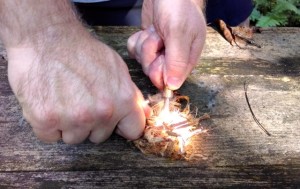 When it comes to Outdoor Living Skills, I’ve heard it asked many times over the years… “what should I learn first?”
When it comes to Outdoor Living Skills, I’ve heard it asked many times over the years… “what should I learn first?”
It needs to be stated at the beginning of this article that our society is more fast paced than ever. And while the extraordinary amount of information that is so readily available is fantastic, when it comes to outdoor living skills, most of it has been done before. You will find nothing new in this article except perhaps its context being new to you.
It was just a few generations ago that much of the outdoor ‘common knowledge‘ wasn’t so common anymore. Nowadays, most parents and grand parents are from the city or suburbs, so their children have to look elsewhere. With the volume of information today, and in so many different forms of media, comes with it the task of weeding through the good, the bad, and the ugly. Good luck building confidence with that foundation.
So who is this article for?
People vary in experience, interests, geographical environment and so forth. Therefore, some of the suggestions below may not fit everyone. And if you are middle-aged or older, already skilled, and/or set in your ways, this article may fall into that category of trying to “teach an old dog new tricks.” I mean no offense, but it would probably be along the lines of me truly adopting social media… I try, but it is not going so well, i.e., I’ll understand if you don’t like this article. As a reminder, it is just a suggestion anyway.
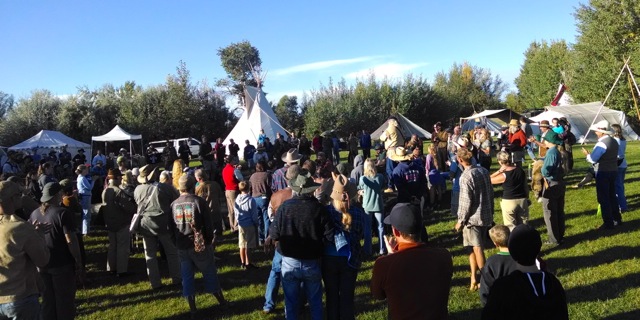
Rabbitstick Primitive Skills Symposium 2013
This is more for the person, young or old, that has an inquisitiveness towards science and the mechanics of how we humans relate to nature. Regardless of the activity, I do believe that outdoor enthusiasts should have practical knowledge of basic wilderness survival skills (more on that later). Anyone venturing into the backcountry not only owes it to themselves, they owe it to their family, friends, and their potential rescuers.
Learn to Return; Learn to Stay
My good friend Tom Ray shared a story with me as it relates to survival and primitive skills, and I am going to use it as the metaphor of what to learn first. ‘Mountain’ Mel Deweese’s great slogan, “Learn to Return,” is logically a set of skills you want to obtain so you can make it back home. Joking with Mel, Steve Watts flipped his slogan to “Learn to Stay,” relating it to primitive living skills.
So “what’s first?” is a set of skills to get you back home, Learn to Return. Then focus on those skills that will help you Learn to Stay. The more skills (and knowledge) you acquire, the closer these metaphors come together as you will see when we discuss below how skills = comfort.
Before we get started though, I think it is worth noting that many people that ask the question, ‘what first,’ don’t realize how much they already know. Sometimes they just don’t know how to put their knowledge into context for what it can accomplish and when to use it. That’s why your source of information is so important.
As an example, most folks into outdoor skills are somewhat familiar with the debris shelter. This ’emergency’ shelter uses natural materials to shelter you from cold weather by arranging natural debris (sticks and usually leaves) where it traps your body heat and sheds precipitation if properly constructed. You will find it in many books, there are dozens of YouTube videos on it, and it does work. But that doesn’t mean it should be the course of action you should take if put into a situation where you need to spend the night out…
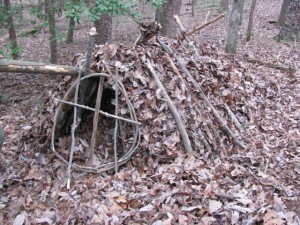
Before being completely stuffed with leaves and wedging myself inside, the front view with door to hold debris in.
I have formally trained with dozens of instructors. On three of those occasions, all at different schools, I have been taught how to properly build a debris shelter for survival. While these instructors were far more skilled than me, not one of them expanded beyond here is a shelter for survival and where to locate it. How it related to my well-being in any other way was NOT covered. You know, the important stuff like…
- What to do if you can’t build one because you’re hurt?
- What do you do if you don’t have enough time? By the way, if you haven’t built one before, expect about 4 hours (this is survival, not optimal conditions).
- How does it relate to your energy use and hydration?
- What if you are dressed properly to begin with?
- What about alternative natural shelters?
- Improvising shelter from man-made materials?
- What about producing body heat and/or fire as an alternative?
- Should I use this if it is already wet out?
- What seasons would I want or not want to use this?
The good schools, instructors, and books give you a foundation (survival knowledge applied) so you can think for yourself. Then they help you master specific skills and teach how they relate to your overall well being. I believe your approach to learning outdoor skills should be the same.
So where to start?
As stated earlier, a foundation of wilderness survival using modern skills should take a front seat, i.e., Learn to Return. In my opinion and that of many others, IF there was just one book currently in print to cover this, it would be 98.6 Degrees, The Art of Keeping Your Ass Alive. Page 75 has a great outline of the Cold-Weather Bottom Line considerations when recreating outdoors; I strongly suggest you check it out and keep that outline in mind when training (survival and comfort). I also really like Mors Kochanski’s rationale in that, if you can get 8 hours sleep and hydrate, you have it made. So simple, yet it covers so much by providing direction. And if you can figure out how to get good sleep, you are making yourself comfortable.
My suggestions of what to learn first are outlined below. They are NOT a list of priorities of what to do in an emergency; that can vary depending on the situation. They are a suggested foundation of knowledge based on a conglomeration of sources I have trained with over many years and through my own field experience.
Please keep in mind what is presented here in this short article is linear in nature. So much of it is related to each other. That is why training with someone who makes their livelihood teaching survival can be so advantageous. AND/OR finding the right literature. As the assumption here is you are just getting started, in addition to the book 98.6 Degrees, we suggest the following book as it complements the skills below quite well for most northern climates; Basic Safe Travel and Boreal Survival Handbook. For a full list of recommended books, check out our bibliography.
SUGGESTED OUTDOOR SKILLS TO LEARN FIRST
I. Learn How To Reduce Your Body’s Heat Loss
- Understand the 5 heat loss mechanisms; Conduction, Convection, Radiation, Respiration, and Evaporation.
- Learn how to properly dress! The importance of both clothing materials and layering. Also, sleeping bag selection and use.
- Learn how to create makeshift shelters and needed ground insulation from tarps, ponchos, space blankets, trash bags, and blankets. Modern materials exponentially save you on time, energy and usually effectiveness (period)!
- Learn to make appropriate shelters (and ground insulation) from the natural materials in YOUR environment of travel thru local training, research and practice. The most universal is an open lean-to with a fire in front of it (not a debris shelter). I would argue if you have the time and the physical capacity to build a debris shelter, you are likely not in a survival situation. Sorry, I digress.
II. Producing Heat – there are basically three ways for a human to produce heat in the wilderness:
- Food – learn the right foods to pack and keep in your survival kit for the environment & season.
- Exercise – learn the physiological effects of exercise including the 60% rule.
- Fire – the second most important skill after knowing how to dress (per M. Kochanski) as it is the one tool that can make up the greatest deficiencies of not being clothed properly or that clothing being compromised. Learn how to light a fire under any circumstance and how to manage. Read the linked article and its links at the end here.
III. Water & Physiological effects
- Know the stages of dehydration and prevention.
- Understand the physiological (and mental) effects of dehydration.
- Water collection (for your environment) and treatment. The link is an example for me in my area.
IV. Signaling
- Signal mirrors – use and selection.
- Know 3 audible blasts (whistle, gun, horn) = emergency
- Basic ground signals, how to create contrast/movement
- Signal fire construction & use
V. Wilderness First Aid
- Wilderness First Aid Training
- Understand the stages of hypothermia, cold-weather injuries, and physiology of dehydration in particular.
- Same for hyperthermia.
- Recognize that any indicator of pain or discomfort must be addressed right away when in the wilderness.
- Understand the importance of hygiene and how to keep you and your camp clean.
VI. Navigation
- Basic Map & Compass Use
- Instinctive Navigation
- I will also add in here letting someone know: where you are going, when you will back, what you are driving, who are you going with, and what you will be doing. The more information, the more it will help potential rescuers.
VII. Survival Kits
“The quality of a survival kit is determined how much it can help you when you need to sleep. If you can sleep well at night, you have it made. It should also assist you in meeting your water needs.”
– MORS KOCHANSKI, Survival Kit Ideas pocketbook
VIII. Controlling Fear / Conservation
I strongly suggest your read the Fear, Preparation, and Planning aspects in the fore mentioned books and others. It will help you in so much more than Wilderness Survival. As Gene Fear says in his out of print book, Surviving the Unexpected Wilderness Emergency,
Survival is 100% mental because the mind controls the body, its actions and reasoning. Since it is so powerful, we must understand and recognize the conscious level dangers and even consider some of the unusual functions of the subconscious mind.
The Bible says, “As he thinketh in his heart, so is he.” The truth in those few words is evident every day. If a man says he feels lousy – he will. If a man says he feels great – chances are he will – all day. The same applies to any given task. If you think it will fizzle, it will. If you are convinced you can do it, more often than not you will succeed.
That being said, one of the bigger fears folks seem to have is fear of discomfort. We live in a time of such convenience where the flip of switch provides light, the turn of a knob offers drinkable water, and pain and cold can be alleviated easily at anytime.
Some people talk of ‘roughing it’ in camp. Well, a tenderfoot may find it rough and uncomfortable. But there is no ‘roughing it’ for an old Scout; he knows how to look after himself and make himself comfortable. If he has no tent, he doesn’t sit down to shiver, but sets to work to rig up a shelter or hut for himself. He chooses a good spot for it where he is not likely to be flooded out of a storm if rain were to come on. Then he lights a camp fire, and makes himself a soft mattress of ferns or straw. An old Scout is full of resource. He can find a way out of any difficulty or discomfort.
The above quote from the founder of Scouting, Robert Baden-Powell, who camped all over the world and wrote this before the ultra-light stoves and synthetics of today demonstrates it’s not the fancy gear that makes you comfortable, it’s what you know!
SKILLS = COMFORT; Learn to Stay
After all the aforementioned suggestions, I would look at specific skills that can make you more comfortable in the environment you intend to stay and the activity in which you participate. Are you modern backpacking, car camping, canoeing, mountaineering, trapping and in what season(s)? Are you in a temperate forest, boreal forest, temperate rainforest, tropical rainforest, alpine, arctic, desert, jungle, etc.
Where you are AND what you are doing should dramatically impact the skills you go after. Train locally in your environment if possible, especially if you are interested in primitive skills. We have a list of schools with their geography identified HERE. Further suggestions on skills can be found in our Master Woodsman Training. And if Primitive Skills is your thing, see the provided link for suggestions on where to start. Again, these should take a back seat to learning modern wilderness survival.
FINAL WORDS
Even though this article is just words, I hope for those of you that need them, they point you in the right direction. Once you start though, you’ll never stop…
“In the school of the woods…
There is no graduation day.”
– Horace Kephart
Camping and Woodcraft, 1917


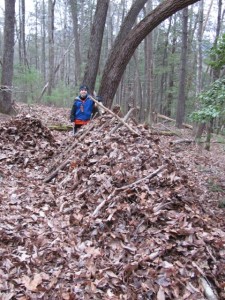
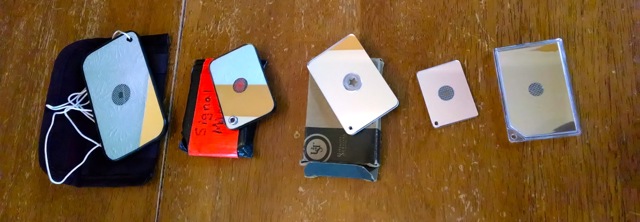
3 Responses to Suggested Outdoor Skills To Learn First…